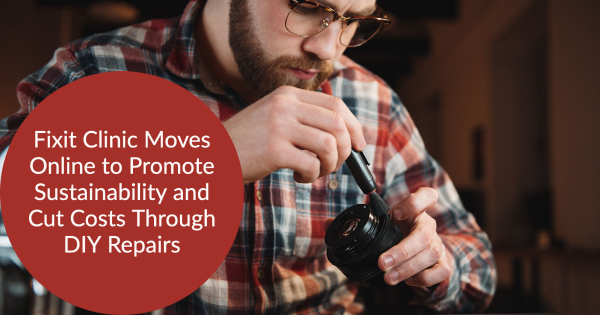
Right now, many Americans are being forced to figure out how to fix their own appliances and household issues themselves in a way that they didn’t necessarily have to before. Prior to the COVID-19 pandemic, it was fairly easy to have home repairs taken care of by professionals, whether the issue had to do with refrigerators or electricity. The pandemic has made this significantly more complicated for a few different reasons. For one thing, people are more reluctant to invite strangers into their homes, understandably. Social distancing has forced people to prioritize who they associate with and why. Those that are elderly or immunocompromised must be especially careful, as they are more at risk of dying if they contract the coronavirus. Additionally, many people simply don’t have the additional money to spare and need to save in whatever ways they can. Millions of people have lost their jobs due to the pandemic, and though home repairs are necessities, if DIY home repair tips can take the place of a handyman the savings are much appreciated.
The alternative to working with the pros would typically be to go online and look up DIY tutorials. But quite often, it’s difficult to decipher which tutorial is giving the right advice, at least not without a good bit of trial and error that can result in more damage being done. Additionally, those in need of help can waste a lot of time clicking through different tutorials before finding one that actually addresses their problems. That is why Fixit Clinic was created. Fixit Clinic comes with a fairly straightforward motto: “Education, entertainment, empowerment, elucidation, and ultimately, enlightenment through the guided disassembly of your broken stuff”. Ultimately, this means empowering individuals through DIY home repair tips online.
Initially, the Fixit Clinic was conceived of as a series of in-person events. People would bring in different items that were not working in order to seek the guidance that they needed. The issue at hand quickly became clear. People not only did not have the DIY home repair tips necessary to conduct things like basic toilet repairs; they also didn’t understand how the broken equipment worked in the first place. Therefore, it became the mission of the Fixit Clinic to educate people about how their items worked, in order to empower them to fix them on their own.
The Fixit Clinic uses people’s own broken items in order to teach them the basic steps of DIY home repair tips. They focus on basic disassembly, which involves taking things apart, troubleshooting, and repairs. Not only does this teach people to conduct things like furnace repairs; it also focuses on sustainability and consumption. Rather than immediately moving on to have a piece of equipment replaced, for example, owners become empowered to sustain them for the long term and reduce their own personal waste levels.
As previously mentioned, the Fixit Clinic began as a series of in-person events, almost like seminars. Then COVID-19 came into play, putting something of a wrench in the clinic’s plans. Fortunately, many of the DIY home repair tips that Fixit Clinic teaches can be conveyed remotely. In many ways, these distanced meet-ups have actually been beneficial. Through them, Fixit Clinic is able to reach a wider audience of people and therefore answer a wider range of questions. In this sense, Fixit Clinic is able to move beyond general equipment repairs, and into more specialized territories when necessary.
How Fixit Clinic Works
The process through which people can take advantage of Fixit Clinic’s services is actually fairly simple. Participants can sign up for Fixit Clinic online, after which they will submit their broken equipment to a global community of repairers, as they are sometimes referred to, for advice and DIY home repair tips. After everyone is signed up for a meeting, they will then be put into groups depending on the issue at hand and the type of equipment that is being used. The Zoom meeting will be divided so that each group can be matched with the appropriate Fixit Clinic guru. In their breakout rooms, the gurus will focus on offering suggestions and hopefully fixing the items.
Of course, some might have questions about DIY home repair tips when the meetings aren’t occurring. That is why Fixit Clinic has also provided a Global Fixers Discord Server. This server functions as a place where the community can meet online for advice around the clock. Although these types of tips may not be quite as comprehensive as those offered through Zoom meetings, they remain highly effective. The server allows people a more specialized location where they can look for the help that they need, rather than sorting through thousands of different answers of varying quality on search engines like Google.
Not every item can be fixed, of course. Fixit Clinic offers no guarantees that an item will be repaired through its sessions. No matter how much of an expert a person is on certain types of equipment, there comes a point where a piece of equipment is simply beyond repair. With that in mind, the focus turns towards teaching those involved in the clinic what went wrong and how to avoid similar shutdowns in the future. Additionally, the issue is somewhat lessened by the fact that there is no cost involved. While some repair services will require an automatic, non-refundable diagnostic fee, the Fixit Clinic is free. Therefore, if something catastrophic did go wrong with a piece of equipment, there is no money lost in receiving the bad news. In contrast, some people are understandably so worried about having to pay money simply to be told that their item is broken that they don’t attempt to seek repairs in the first place. Instead, they simply throw out the item and buy a new one. While this action is understandable, this is both a waste of equipment and a waste of money in many cases.
A variety of different items can be repaired with the help of the advice given by the Fixit Clinic. The initial focus was on smaller pieces of equipment, but over time the expertise of those involved expanded to include bigger items. These include dishwashers, televisions, and even pieces of furniture. The Fixit Clinic is always open to taking on more experts as well, which means that in the future even bigger and more complex pieces of equipment like garage doors could potentially be included in the roster of items that people wish to have fixed. Mobile technology, after all, is making it easier than ever for people to move their Zoom meetings anywhere they wish. This will further enable the Fixit Clinic to move where people need it to be.
How People Can Get Involved
There is more to Fixit Clinic than just teaching people DIY home repair tips. The clinic is dependent on a sense of community, and of course on people being willing to donate their time and energy to teaching others to be more independent and sustainable. Therefore, people do have the opportunities to start their own clinics if they feel compelled to do so. The process involves visiting Fixit Clinic’s website and committing to holding Fixit Clinics as an ongoing effort. This means not hosting one clinic and moving on, but being a part of regional ongoing events. The point of Fixit Clinic is not to be solely meant for one community, one time, but to help as many people as possible as much as possible. Certainly, the distance learning approach is aiding in this process.
Then, the person that wants to start their regional clinic should begin recruiting Fixit Coaches as quickly as possible, and in a variety of different disciplines. If the clinic is going to involve distance learning, it will be conducted through a Zoom event. If the clinic is being held after pandemic restrictions are lifted, the host of the clinic should secure a venue. Often, Fixit Clinics are held with the help of community sponsors. Word should be spread about the event in order to ensure that there is community interest. After enough sponsors and coaches have been collected, the person in question should contact Fixit Clinic directly, fill out the Fixit Clinic template, and begin promoting the event.
It is important for Fixit Clinic that coaches are recruited before Fixit Clinic is contacted. A Fixit Clinic is dependent on reliable, expert coaches and it should not be attempted until these people have been recruited. Additionally, it should be noted that Fixit Clinics are ultimately gatherings of Fixit Coaches, with participants ready to learn invited to attend. Fixit Coaches can learn from each other and share different skills. For example, one person may know more about printer repairs, while another individual could be more of an expert on plumbing.
The goal is for those that learn from these coaches to ultimately be absorbed into the Fixit Clinics and become coaches themselves. This will allow for an ongoing system of new people being added to the clinic and gradually learning enough that they can share their own expertise. While nobody is going to be an expert on everything, there is no need for someone to learn about AC repair and stop there when they could expand their skills over time rather easily. It’s important, in this sense, for those that begin Fixit Clinics to not feel discouraged if their initial turnout is not what they expected. As long as there are Fixit Coaches gathering together and sharing their skills, then the goal has already been reached. Additionally, it can take some time for word to spread about a Fixit Clinic, and the turnout could easily build as people learn more about these clinics over time.
For some, the intimidating issue might be finding people that both understand enough about home DIY repair tips to help, and are willing to give the assistance needed. The reality is that it can be difficult to find Fixit Coaches at first, but there are resources that individuals can turn to. It’s a good idea for those interested in beginning a Fixit Clinic to seek out fraternal organizations with histories of giving back to the community, Church organizations, Rotary Clubs, and similar such groups for help. Typically, these types of people are already used to presenting at community gatherings and are eager to assist.
Furthermore, Fixit Clinic’s website offers resources for those that wish to recruit good Fixit Coaches, with the help of forms and flyers. The person leading the Fixit Clinic should consider their own skills, as well as the skills that they feel would best help those in their community. All Fixit Coaches with wisdom to impart should be welcome, but in certain areas where corrosion problems may be common a Fixit Coach with a background in water treatment or plumbing may be especially appreciated.
Fixit Coaches should also be aware that the clinics are not necessarily about fixing things for people, but about educating them. If someone approaches a Fixit Coach with a question about their sink draining improperly, the responsibility of the Fixit Coach is not to take the sink apart by themselves and fix the issue. Fixit Clinics are free, and it’s important that people, especially those that already work as professional service providers, value their own work. Rather, a Fixit Coach would approach that type of issue and ask questions. Is there a hard water issue in the home? When did the problem begin? Those that are volunteering as Fixit Coaches should place an emphasis on the responsibility of coaching. Education through providing DIY home repair tips is a key component of Fixit Clinics, and should not be undervalued.
Fixit Clinics are here to help people understand DIY home repair tips both large and small. Ultimately, they can not only aid in making life a bit easier but promoting keeping and repairing an item rather than throwing it out. Why should someone toss a portable fridge freezer, for example, when they can repair and keep it for years to come? Why do people spend over $10,000 on average on home renovations when they could cut costs through repairs? This outlook will not only save money but advance sustainability in the long term.



